Leopold II and the "Free State of the Congo": how the Belgian king staged genocide in a country in which he had never been
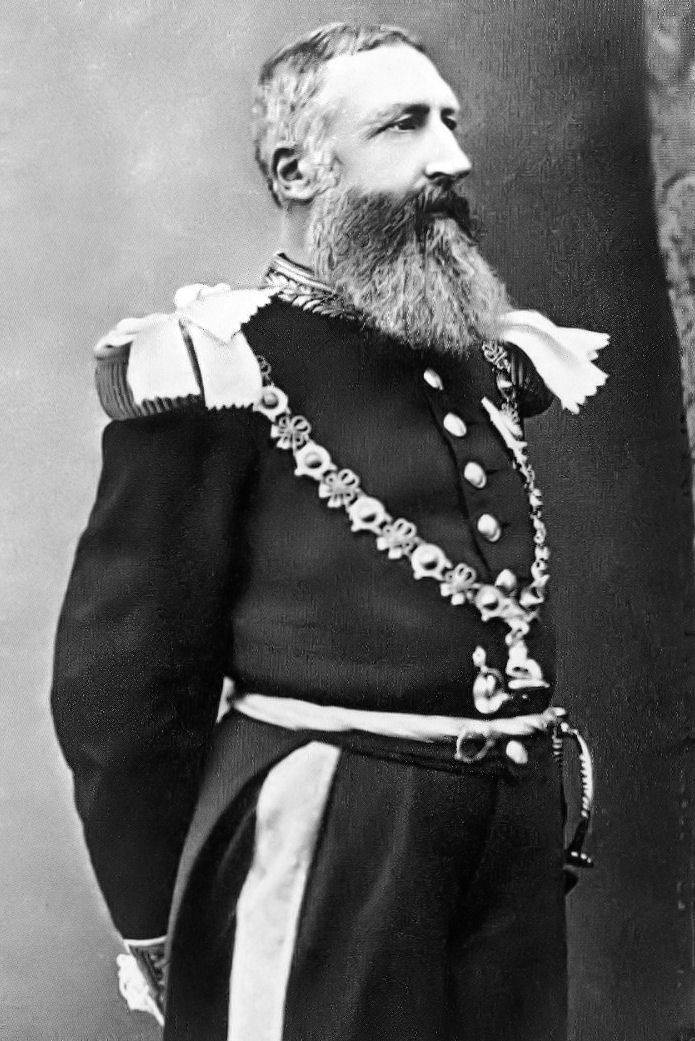
Leopold II
Among the dictators of Africa, involved in massacres, atrocities and genocides, a special place is occupied not by an African at all, but by King Leopold II of Belgium. Judging by the number of murders, he will easily give odds to Bokassa, Amin and Taylor combined. How did the king of a small European country manage to become the organizer of one of the largest genocides in Africa, we will tell in this article.
Limited Monarch
Leopold II became King of Belgium in 1865 at the age of 30. He inherited a country with a constitutional form of government, literally every action he had to coordinate with the parliament. One day, Leopold tried to become a more independent ruler, but ran into tough opposition from parliament, which did not allow him to change the Constitution in his own interests.
Having not received unlimited power in Belgium, Leopold began to think how to acquire it in some other part of the globe. Then the thought came to him that Belgium needed colonies. France, Great Britain, Spain and Portugal have had colonies all over the world for several centuries. Belgium, which emerged as a state only in 1830, seemed to be forever behind them in this matter.
Leopold turned to the Spanish government with a request to sell the Philippines to him, but the Spaniards raised such a price that the idea had to be abandoned soon after.
At that time, and the 1870s were already in the yard, there was an active colonization of Africa. Europeans still have not reached the Congo located in Central Africa. A number of factors prevented colonization in the past: impenetrable jungle, tropical diseases, and a seeming lack of direct economic benefits.
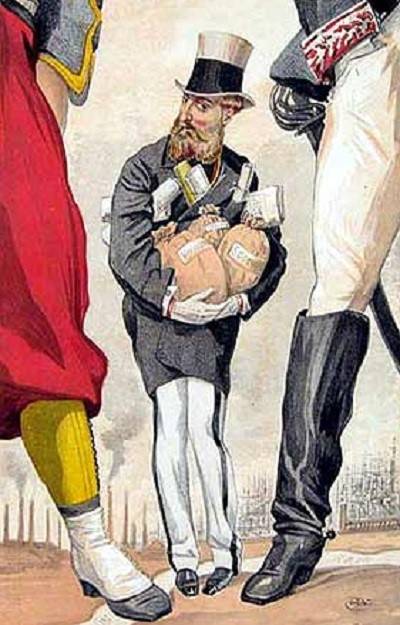
Caricature of Leopold the "dealer king" in Vanity Fair, 1869
In 1876, Leopold founded the "International African Society", which officially was supposed to deal with humanitarian issues, but in practice it was under the guise of this organization that the colonization of the Congo began.
In the late 1870s, the African traveler and explorer Henry Stanley and a number of other confidants of Leopold entered into more than 400 agreements with the Congolese leaders, according to which their land became the property of Leopold in exchange for fabrics and other trinkets. So, thanks to the local corrupt elite, in less than 10 years, Leopold managed to subdue a vast territory, which was 76 times larger than Belgium.
"Congo Free State"
Initially, Leopold's actions provoked protests from Great Britain, which itself had views of these lands, but since the British colonized other countries at that time, they could not prevent Leopold. In 1885, the Berlin International Conference, which met specifically to divide the spheres of influence in Africa, recognized Leopold's rights to the Congo. In the same year, the occupied lands became officially known as the "Congo Free State" (FFS). Since for the Congolese themselves from that moment on freedom is a thing of the past, this name will soon begin to be perceived with irony.
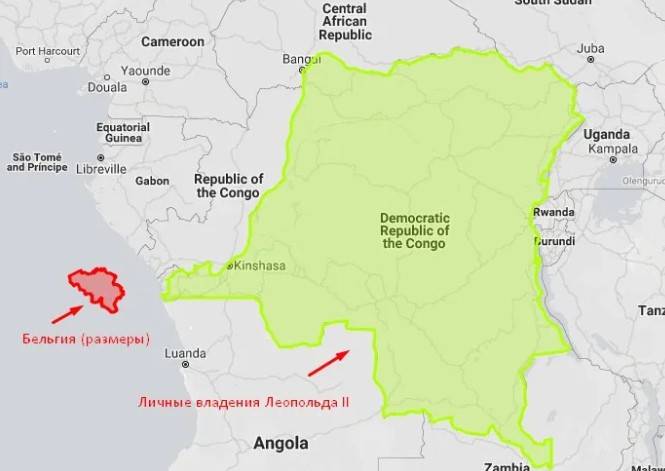
Size comparison of Belgium and Congo
It is important to note that the Congo did not become a colony of Belgium, but in fact the personal possession of Leopold himself as a private individual. Therefore, there could be no question of either the operation of Belgian laws, or any interference in the affairs of the Congo by the Belgian parliament. Here Leopold became not just an unlimited monarch, but a complete master.
At first, Leopold engaged in the extraction of ivory, but the income was insignificant. And when the prices for rubber increased significantly in the world, it was decided to focus on its production.
The authorities of the Congo appointed by Leopold issued laws according to which all local residents had to pay taxes by labor service, working for free. At the same time, so that no one in Europe would have objections, Leopold banned the publication of all decrees relating to internal politics in the Congo.
So Africans were actually turned into slaves and forced to work on rubber plantations. The work was done by everyone from children to the elderly. At the same time, slavery did not officially exist in the Congo Free State. For example, unlike the classic slave or serf, the Congolese could not be sold or donated. But on the other hand, it was possible to kill, maim, rape, make them work to the point of complete exhaustion.
The gendarmerie "Public Forces" (Force Publique) was created to control plantation workers. In fact, it was Leopold's private army. Ordinary soldiers were recruited either from the local population or from Arabs or West Africans. The officers were Europeans. "Public forces" became overseers and punishers, raided the villages and killed those who refused to work. To force men to work, women were often taken hostage.
Each cartridge was counted by the soldiers, therefore, as proof that they were used for their intended purpose, and not sold to local hunters, the punishers had to provide the hands of the dead. But often brushes were cut off from living people as punishments for not fulfilling the work plan.
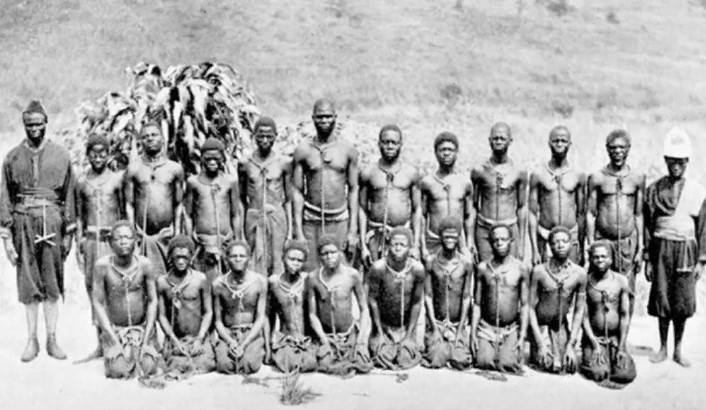
Rubber plantation workers in the Congo
In atrocities, not only Belgian officers showed zeal, but also local ordinary soldiers, who now felt their power in relation to their disenfranchised compatriots and the opportunity to settle old scores. In addition to this, the disenfranchised plantation workers actually supported the "Public Forces".
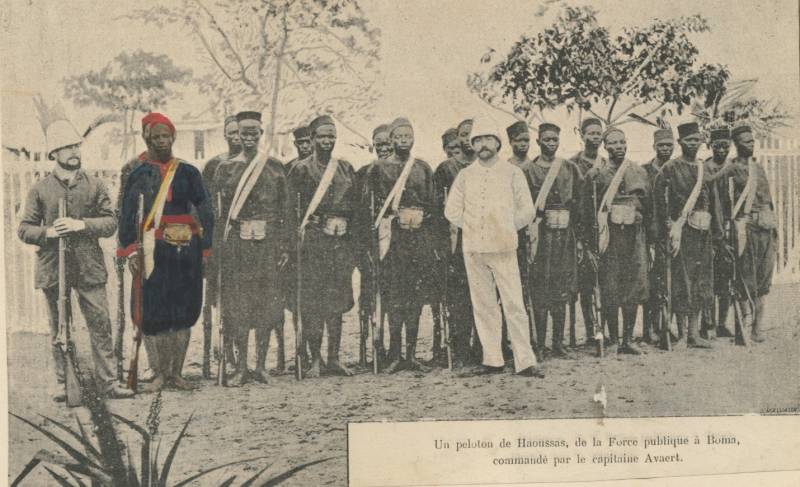
Soldiers of the "Public Forces". As you can see, for two white officers there are about two dozen black privates.
Eyewitness accounts
Of course, the story of the abuses and atrocities of the SGK administration appointed by Leopold would be incomplete without mentioning the testimonies of eyewitnesses - those who saw everything with their own eyes. Among these eyewitnesses were different people: officers who did not want to participate in atrocities, travelers, officials, missionaries, writers and many others.
Charles Lemaire described the day-to-day functions of the Forces Public as follows:
June 14, 1891. Raid on the village of Lolivu, whose inhabitants refused to come to the stronghold. Disgusting weather, torrents of rain. A large group of villages, could not destroy everything. 15 blacks killed.
June 14, 1891 at 5 am sent a Zanzibarian Mechoudy with 40 soldiers to burn Nkole. The operation was successful.
On July 13, 1892, Lieutenant Sarazain conducted a raid on the village of Bompopo. 20 natives killed, 13 women and children captured.
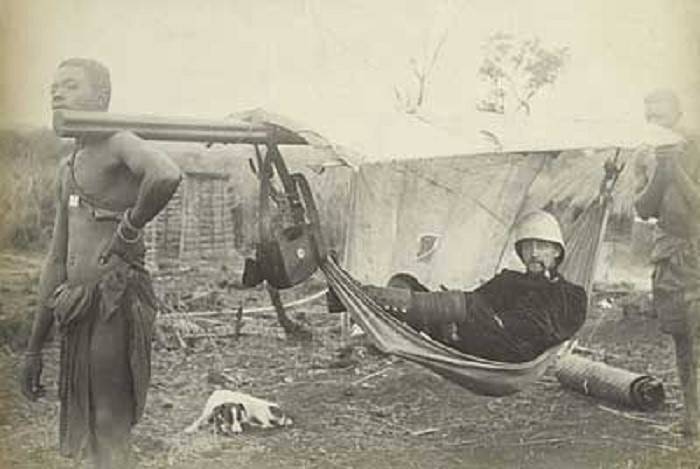
Belgians in the Congo
Officer Louis Leclerc described a similar picture of what was happening:
The British traveler Ewart Grogan wrote in 1899 about the northeastern regions of the Congo, which bordered on British possessions:
In 1899, the writer Joseph Conrad published the story "The Heart of Darkness", describing many of the crimes in it, after which the European press first drew attention to this problem. In 1902, under pressure from Great Britain, Leopold II was forced to send a commission to the country. Here are excerpts from the testimonies of the Congolese, which were collected by this commission:
A native girl reports: “On the way, the soldiers noticed the child and went towards him with the intention of killing him; the child laughed, then the soldier swung and hit him with the butt, and then cut off his head. The next day they killed my half-sister, cut off her head, arms and legs, on which there were bracelets. Then they caught my other sister and sold her to the woo tribe. Now she has become a slave."
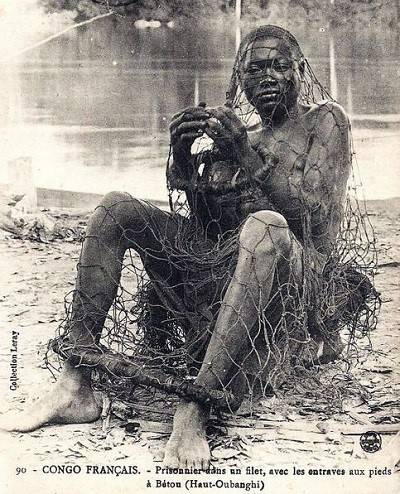
Slave in the Congo
A significant contribution to the fact that the situation in the Congo became public property was made by the British writer, publicist, activist, pacifist and opponent of colonialism Edmund Morel. He founded the Congo Reform Society, criticized Leopold and his subordinates in his newspaper, and in 1906 published the book Red Rubber. She caused a wave of indignation at Leopold's actions both in Europe and in Belgium itself, and became one of the main reasons why the king was eventually forced to give up his rights to the Congo.
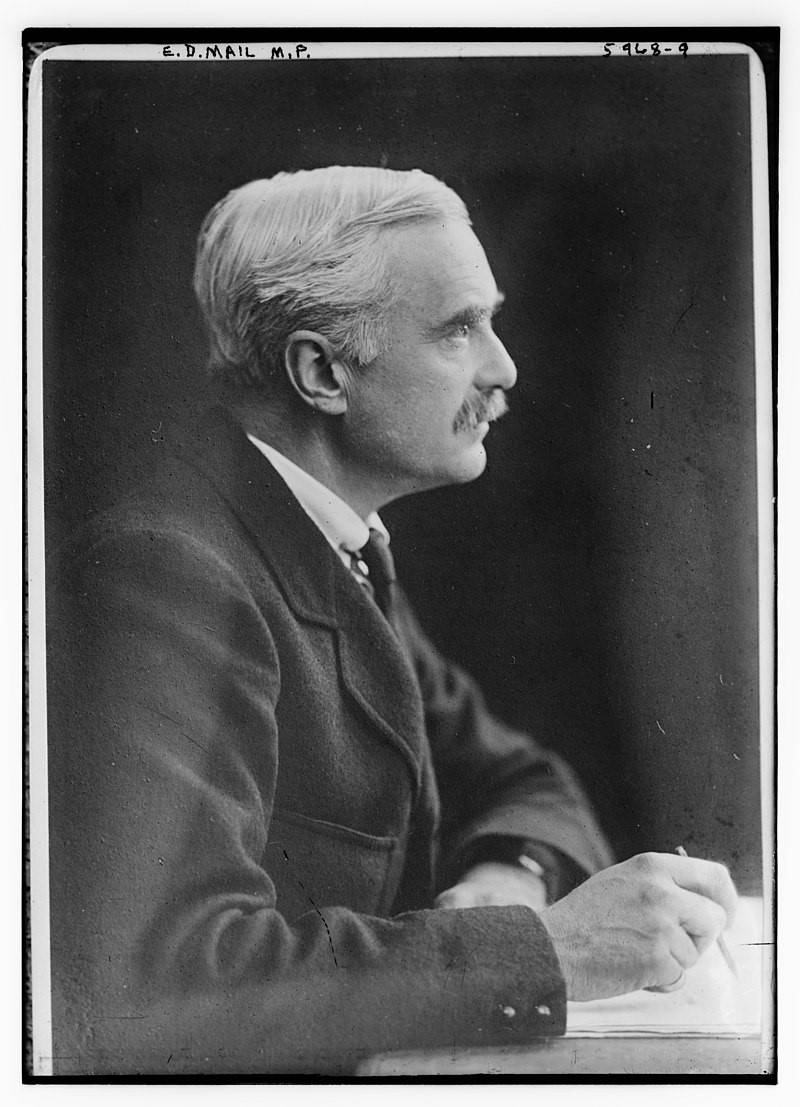
Edmund Morel
A few years later, another British writer, Arthur Conan Doyle, became interested in the topic of atrocities in the Congo. In 1909 he published Crimes in the Congo, in which he wrote:
"Queen of the Congo"
As you might guess, all the juices were squeezed out of the Congolese on the plantations by such methods. Official figures also speak about this. Rubber production rose from 30 tons in 1887 to 5900 tons in 1903. Thanks to this, King Leopold became one of the richest people in Europe.
He spent huge sums on the maintenance of his French mistress Blanche Delacroix (also known as Carolina Lacroix). They met when he was already 65 years old, and she was 16. The young French woman at that time worked as a prostitute in Paris, was able to demonstrate great skill in her "craft", and she was introduced to the king. So they became lovers. There was already freedom of speech in Belgium at that time, so one of the newspapers wrote caustically about this connection:
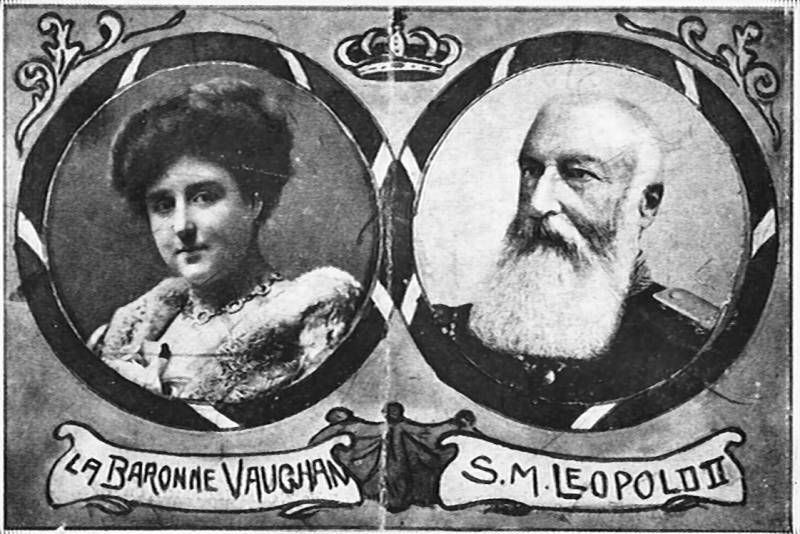
Postcard with Leopold and Caroline
After the death in 1902 of Leopold's wife, Karolina became his concubine. The king bought her numerous villas and mansions, including those on the Cote d'Azur in France, bought jewelry, and gave large amounts of cash. Gave her the title of Baroness Vaughan. In the press, Carolina was nicknamed the "Queen of the Congo", because everyone knew perfectly well the origin of this money.
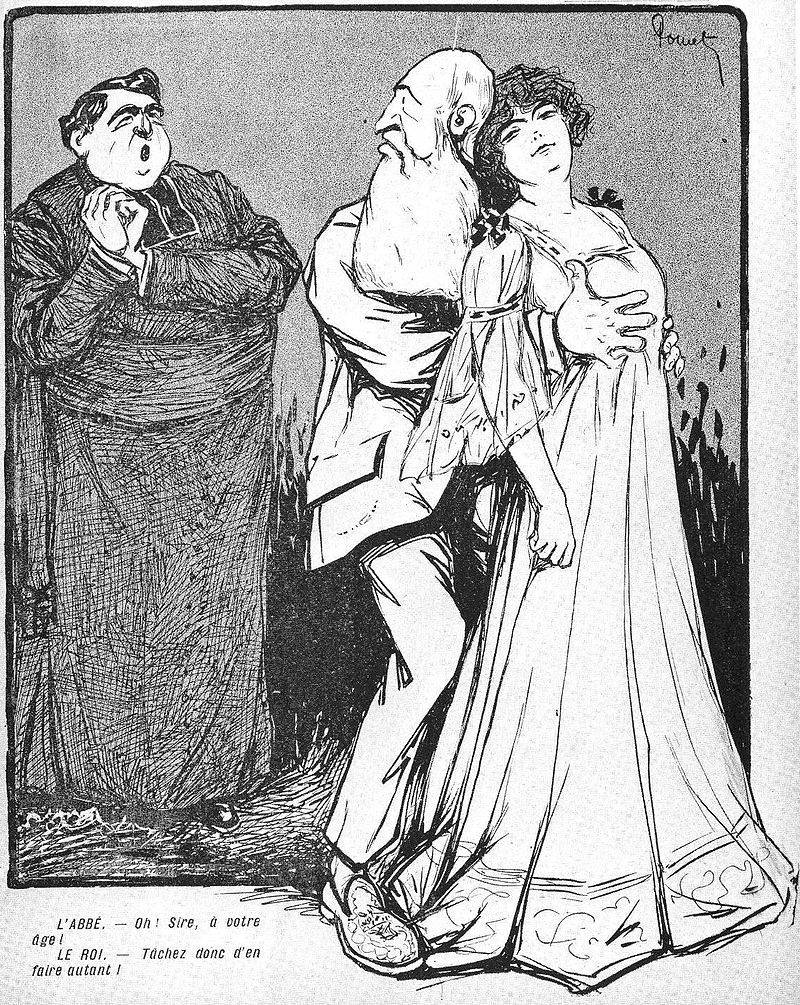
Caricature mocking Leopold's relationship with Caroline. The priest exclaims: “Oh, sire! At your age!”, and Leopold replies: “Try the same!”
Five days before his death in 1909, they entered into an official marriage, but the Belgian Parliament declared it invalid. Subsequently, Carolina Lacroix lived a long life. Leopold's heirs tried to take away all the royal gifts from her, but to no avail.
Carolina had so much money that 40 years was not enough to spend it all. When she died in 1948, her son and Leopold inherited the fortune.
The fate of the Congo
After the publication in the press of numerous eyewitness accounts and Morel's book, Leopold was forced under pressure to give up the Congo as his private property. In November 1908, a few months before his death, he sold this country to the state of Belgium. Now the "Free State of the Congo" was simply called the "Belgian Congo" and turned into an ordinary colony. In all his life, the king himself never visited the Congo, managing it remotely with the help of proxies and only reaping the fruits of the work of millions of disenfranchised Congolese.
Before the sale, Leopold destroyed all the documents that compromised him.
The exact figures for Congo's losses during Leopold's reign are still unknown. Various sources cited figures from 3 to 15 million people. It is impossible to calculate them exactly for a number of reasons. These are the documents destroyed by Leopold, and the fact that in a number of cases no one simply counted the dead. Many Congolese died from starvation and epidemics, many from injuries and unbearable working conditions. Leopold and his subordinates in the field did not consider it necessary to build hospitals, therefore, in the absence of medicine, even a minor illness could become fatal.
It is believed, again according to very approximate data, that the total population of the Congo from 1884 to 1915 decreased from 30 to 15 million people.
Congo was then a Belgian colony for 52 years until it gained independence in 1960. Its capital, the current Kinshasa, was called Leopoldville until 1966. Like the vast majority of other African countries, the Congo was unable to use this freedom for peaceful construction and raising the standard of living. Civil wars broke out in the country. And as a result of civil wars at the turn of the millennium, about 6 million Congolese died.
Today's Congo is one of the poorest and most backward countries in the world. The rich resources of the country, which did not benefit it, are under the control of foreign corporations. And the population is infected with AIDS in large numbers.
Summing up all that has been said, I would like to pay special attention to the fact that such a large country, 76 times larger than Belgium, was conquered without major wars, not even by Belgium itself, but by its ruler. Undoubtedly, the betrayal of the elite, those local leaders who were ready to sacrifice the freedom of their wards for money or trinkets, played a big role in this. But it is impossible not to pay attention to the extreme weakness and passivity of the population itself. He was subjugated easily and relatively quickly, for more than two decades he was used as slaves without rights, killed and maimed, and during this time there was not a single major popular uprising! The genocide stopped thanks not to the resistance of the Congolese, but to the wide publicity in the media, which was made by caring citizens of other countries. Here the thought arises that if Leopold had not conquered the Congolese, then someone else would inevitably have done it.
Information